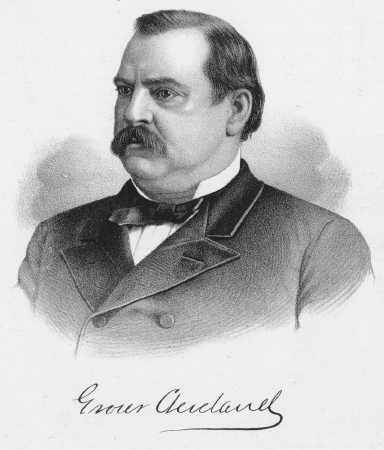104 S.
GROVER CLEVELAND.
S.
GROVER CLEVELAND.
calling for life, and, reversing the traditional
order, he left the city to seek his fortune, instead
of going to a city. He first thought of Cleveland,
Ohio, as there was some charm in that name for him;
but before proceeding to that place he went to Buffalo
to ask the advice of his uncle, Lewis F. Allan, a
noted stock-breeder of that place. The latter did not
speak enthusiastically. "What is it you want to do, my
boy?" he asked. "Well, sir, I want to study law," was
the reply. " Good gracious! " remarked the old
gentleman; " do you, indeed? What ever put that into
your head? How much money have you got?" "Well, sir,
to tell the truth, I haven't got any."
After a long consultation, his uncle
offered him a place temporarily as assistant
herd-keeper, at $50 a year, while he could "look
around." One day soon afterward he boldly walked into
the office of Rogers, Bowen & Rogers, of Buffalo,
and told them what he wanted. A number of young men
were already engaged in the office, but Grover's
persistency won, and he was finally permitted to come
as an office boy and have the use of the law library,
for the nominal sum of $3 or $4 a week. Out of this he
had to pay for his board and washing. The walk to and
from his uncle's was a long and rugged one; and,
although the first winter was a memorably severe one,
his shoes were out of repair and his overcoat--he had
none-- yet he was nevertheless prompt and regular. On
the first day of his service here, his senior employer
threw down a copy of Blackstone before him with a bang
that made the dust fly, saying "That's where they all
begin." A titter ran around the little circle of
clerks and students, as they thought that was enough
to scare young Grover out of his plans; but in due
time he mastered that cumbersome volume. Then, as ever
afterward, however, Mr. Cleveland exhibited a talent
for executiveness rather than for chasing principles
through all their metaphysical possibilities. "Let us
quit talking and go and do it," was practically his
motto.
The first public office to which Mr.
Cleveland was elected was that of Sheriff of Erie Co.,
N. Y., in which Buffalo is situated; and in such
capacity it fell to his duty to inflict capital
punishment upon two criminals. In 1881 he was elected
Mayor of the City of Buffalo, on the Democratic
ticket, with especial reference to the bringing about
certain reforms in the administration of the municipal
affairs of that city. In this office, as well as that
of Sheriff, his performance of duty has generally been
considered fair, with possibly a few exceptions which
were ferreted out and magnified during the last
Presidential campaign. As a specimen of his plain
language in a veto message, we quote from one vetoing
an iniquitous street-cleaning contract; "This is a
time for plain speech, and my objection to your action
shall be plainly stated. I regard it as the
culmination of a most "bare-faced, impudent and
shameless scheme to betray the interests of the people
and to worse than squander the people's money." The
New York Sun afterward very highly commended Mr.
Cleveland's administration as Mayor of Buffalo, and
there upon recommended him for Governor of the Empire
State. To the latter office be was elected in 1882,
and his administration of the affairs of State was,
generally satisfactory. The mistakes he made, if any,
were made very public throughout the nation after he
was nominated for President of the United States. For
this high office he was nominated July 11, 1884, by
the National Democratic Convention at Chicago, when
other competitors were Thomas F. Bayard, Roswell P.
Flower, Thomas A. Hendricks, Benjamin F. Butler, Allen
G. Thurman, etc.; and he was elected by the people, by
a majority of about a thousand, over the brilliant and
long-tried Republican statesman, James G. Blaine.
President Cleveland resigned his office as Governor of
New York in January, 1885, in order to prepare for his
duties as the Chief Executive of the United States, in
which capacity his term commenced at noon on the 4th
of March, 1885. For his Cabinet officers he selected
the following gentlemen: For Secretary of State,
Thomas F. Bayard, of Delaware; Secretary of the
Treasury, Daniel Manning, of New York; Secretary of
War, William C. Endicott, of Massachusetts; Secretary
of the Navy, William C. Whitney, of New York;
Secretary of the Interior, L. Q. C. Lamar, of
Mississippi; Postmaster-General, William F. Vilas, of
Wisconsin; Attorney-General, A. H. Garland, of
Arkansas.
The silver question precipitated a
controversy between those who were in favor of the
continuance of silver coinage and those who were
opposed, Mr. Cleveland answering for the latter, even
before his inauguration.




